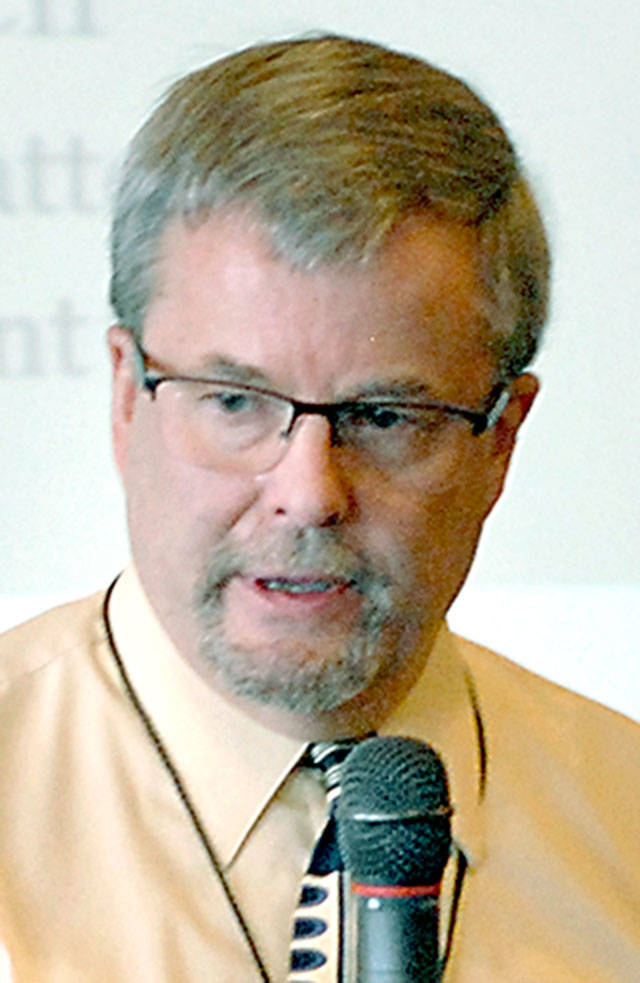PORT ANGELES — City council members are considering a revamp of the council’s 5-year-old ethics code a year after they faced allegations from residents who asserted they had violated the ordinance.
Port Angeles City Council members asked City Manager Dan McKeen at a work session Tuesday to present, within 30 days, five options regarding the rules.
Three of six council members present — Deputy Mayor Cherie Kidd was absent while recovering from laryngitis — suggested the council at least get rid of the code’s Section J, which figured prominently in residents’ complaints between February and May 2016 during the height of controversy over fluoridation of city water.
The complaints were filed by opponents of fluoridation and proponent Marie Wiggins, who claimed four council members violated the Open Public Meetings Act.
Ethics complaints against council members are considered by three-person volunteer ethics boards drawn from nine people who are chosen by council members. The panel recommends a course of action to the council.
Councilmen Brad Collins, Dan Gase and Michael Merideth argued Tuesday for elimination of Section J.
It says public officials cannot “reflect discredit on the public officials” or “tend to bring the city into disrepute,” and must be “honest, accurate, complete, and truthful” and “conduct themselves in a civil and professional manner.”
Whether a person is for or against fluoridation, Section J wrongly presents an option that allows “having an upset public decide if somebody was rude,” Merideth said.
“It comes down to who is mad at who.”
Collins said the motivation for complaints is too often political.
“I favor the idea of not trying to put the city in the position of the city spending money if someone is upset politically,” he said.
“Hopefully, we can simplify this and take the politics out of it.”
Councilman Lee Whetham said the city spent $26,000 in legal fees, while McKeen cited “extensive staff time” to which he could not apply a monetary value.
Only one of the four complaints resulted in an ethics board’s recommendation of disciplinary action, with the other three were dropped or the council member exonerated.
One of the ethics boards recommended the council verbally admonish Kidd for abruptly adjourning a Feb. 2 meeting.
The city council rejected the recommendation in favor of a general pledge to follow state law and be tolerant and respectful of residents. It did not specifically address Kidd’s actions.
The options discussed Tuesday range from keeping the status quo to adopting general ethics guidelines suggested by the Washington Cities Insurance Authority to having a hearing examiner act as a “gatekeeper” who could “make a finding that a complaint brought pursuant to this Ethics Code is frivolous and without merit,” City Attorney Bill Bloor said, quoting from Bremerton’s Code of Ethics.
Other options include naming a permanent three-person board with two alternates and seeking feedback from people who already had served on the boards of ethics established under the existing ordinance.
Gase, who also favored eliminating Section J, favored the hearing-examiner option.
“We don’t owe the public the expense and aggravation and frustration of a frivolous complaint,” he said. “The gatekeeper can take care of that.”
Whetham, one of the first council members to push for a review of the ethics code after Wiggins named him and other council members in her complaint, said he had changed his thinking and supported retaining the ordinance.
Whetham said he favored a committee giving the City Council input but also agreed with Collins about not putting a hearing examiner in the position of, as Collins said, being a “political referee.”
Councilwoman Sissi Bruch said she likes Section J — to a point.
“I appreciate having this because of the times we are in where I feel like, we are feeling like, people are given permission to attack others,” she said.
At the same time, she posited, “who determines what’s what” in defining what constitutes abusive conduct.
Former Superior Court Judges Ken Williams and Grant Meiner were both critical of the present ordinance.
Williams said it was too broad with a “very real” potential for misuse, Bloor said in his presentation.
Meiner suggested his board spent time and energy for naught in its admonishment recommendation regarding Kidd, “and therefore failed to deal with the matter,” Meiner said, according to Bloor.
Bruch said the ordinance was approved by the City Council in 2012 in response to the actions of then-Councilman Max Mania.
It replaced the generalized code the state makes available for all cities to use but which in 2012 was criticized by then-Mayor Kidd for not being specific enough to address two complaints against Mania that could not be applied retroactively to the new ordinance.
Former county Democratic Party Vice-Chair Jack Slowriver had alleged Mania used foul language and was unethical toward her for not supporting Mania’s wife in her unsuccessful bid for Clallam County commissioner, while then-City Councilwoman Brooke Nelson had said Mania had attempted to undermine council positions on Nippon Paper Industries USA’s biomass cogeneration plant.
McKeen said at the time that the code of conduct was not expected to cost the city additional money.
________
Senior Staff Writer Paul Gottlieb can be reached at 360-452-2345, ext. 55650, or at pgottlieb@peninsuladailynews.com.

